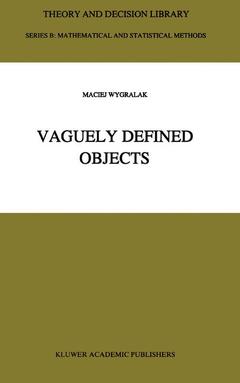Vaguely Defined Objects, Softcover reprint of the original 1st ed. 1996 Representations, Fuzzy Sets and Nonclassical Cardinality theory Theory and Decision Library B Series, Vol. 33
Langue : Anglais
Auteur : Wygralak M.

In recent years, an impetuous development of new, unconventional theories, methods, techniques and technologies in computer and information sciences, systems analysis, decision-making and control, expert systems, data modelling, engineering, etc. , resulted in a considerable increase of interest in adequate mathematical description and analysis of objects, phenomena, and processes which are vague or imprecise by their very nature. Classical two-valued logic and the related notion of a set, together with its mathematical consequences, are then often inadequate or insufficient formal tools, and can even become useless for applications because of their (too) categorical character: 'true - false', 'belongs - does not belong', 'is - is not', 'black - white', '0 - 1', etc. This is why one replaces classical logic by various types of many-valued logics and, on the other hand, more general notions are introduced instead of or beside that of a set. Let us mention, for instance, fuzzy sets and derivative concepts, flou sets and twofold fuzzy sets, which have been created for different purposes as well as using distinct formal and informal motivations. A kind of numerical information concerning of 'how many' elements those objects are composed seems to be one of the simplest and more important types of information about them. To get it, one needs a suitable notion of cardinality and, moreover, a possibility to calculate with such cardinalities. Unfortunately, neither fuzzy sets nor the other nonclassical concepts have been equipped with a satisfactory (nonclassical) cardinality theory.
Vaguely Defined Objects.- Basic Notions and Problems.- Mathematical Approaches to Vaguely Defined Objects.- Mathematical Approaches to Subdefinite Sets.- A Unifying Approximative Approach to Vaguely Defined Objects.- Nonclassical Cardinality Theory for Vaguely Defined Objects.- Equipotencies.- Generalized Cardinal Numbers.- Selected Applications.- Inequalities.- Many-Valued Generalizations.- Towards Arithmetical Operations.- Addition.- Multiplication.- Other Basic Operations.- Generalized Arithmetical Operations.- Cardinalities with Free Representing Pairs.- Further Modifications and Final Remarks.
This unique monograph explores the cardinal, or quantitative, aspects of objects in the presence of vagueness, called vaguely defined objects. In the first part of the book such topics as fuzzy sets and derivative ideas, twofold fuzzy sets, and flow sets are concisely reviewed as typical mathematical representations of vaguely defined objects. The second part uses a unifying, approximative representation, together with Lukasiewicz logic as a basis for constructing a complete, general and easily applicable nonclassical cardinality theory for vaguely defined objects. Applications to computer and information science are discussed.
Date de parution : 11-2013
Ouvrage de 268 p.
15.5x23.5 cm
Mots-clés :
Arithmetic; Cardinal number; Multiplication; addition; cardinality; computer; expert system; fuzzy; fuzzy sets; sets
© 2024 LAVOISIER S.A.S.



